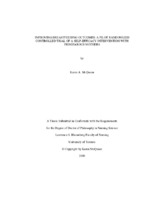Acculturation, self-efficacy and breastfeeding behaviors in a sample of Hispanic women
View File(s)
- Author(s)
- Details
-
Ivonne F. Hernandez, PhD, RN, IBCLC
- Sigma Affiliation
- Delta Beta at-Large
Visitor Statistics
Visits vs Downloads
Visitors - World Map
Top Visiting Countries
| Country | Visits |
|---|
Top Visiting Cities
| City | Visits |
|---|
Visits (last 6 months)
Downloads (last 6 months)
Popular Works for Hernandez, Ivonne F. by View
| Title | Page Views |
|---|
Popular Works for Hernandez, Ivonne F. by Download
| Title | Downloads |
|---|
View Citations
Citations
Breastfeeding confers immunological, physiological and psychological benefits for the infant and mother as well as social and economic benefits to the nation. The United States Department of Health and Human Servcies (HHS), Healthy People 2020 has established national objectives for the initiation and duration of breastfeeding at 82% initiation, 61% at six months and 34% at one year. In addition, they have set goals for exclusive breastfeeding at 3 months to be 46% and 25% at 6 months of infant’s age. Currently breastfeeding initiation is at the highest recorded level of 76.9%, yet significant disparities exist (CDC, 2012). The purpose of this study was to examine the association of acculturation and self-efficacy on breastfeeding behavior of a sample of Hispanic women. Initially the plan was to focus on women from Mexican, Cuban and Puerto Rican countries of origin. However recruitiment goals for only the Mexican population were reached. Two valid and reliable bidimensional instruments were used in addition to collecting contextual information to foster a more comprehensive understanding of the acculturation process. The roles of self-efficacy and social support and their relationship with acculturation measures and breastfeeding behavior was explored. The Non-Hispanic domain subscale of the Bidimensional Acculturation Scale scores were significantly different for those breastfeeding compared to those formula feeding, indicating higher levels of Non-Hispanic domain acculturation associated with not breastfeeding. Acculturation and self efficacy (general and parental) were not found to be related. Breastfeeding outcomes and parental self-efficacy were found to have a significant negative correlation, a finding that was in an unexpected direction, with higher parental self-efficacy associated with decreased breastfeeding intensity.
This dissertation has also been disseminated through the ProQuest Dissertations and Theses database. Dissertation/thesis number: 3631328; ProQuest document ID: 1564775909. The author still retains copyright.
This item has not gone through this repository's peer-review process, but has been accepted by the indicated university or college in partial fulfillment of the requirements for the specified degree.
| Type | Dissertation |
| Acquisition | Proxy-submission |
| Review Type | None: Degree-based Submission |
| Format | Text-based Document |
| Evidence Level | Cross-Sectional |
| Research Approach | Quantitative Research |
| Keywords | Lactation; Postpartum; Exclusive Breastfeeding; Latinos; Culture; Infancy |
| Grantor | University of South Florida |
| Advisor | Groer, Maureen; Jevitt, Cecilia; Himmelgreen, David; Beckstead, Jason |
| Level | PhD |
| Year | 2014 |
All rights reserved by the author(s) and/or publisher(s) listed in this item record unless relinquished in whole or part by a rights notation or a Creative Commons License present in this item record.
All permission requests should be directed accordingly and not to the Sigma Repository.
All submitting authors or publishers have affirmed that when using material in their work where they do not own copyright, they have obtained permission of the copyright holder prior to submission and the rights holder has been acknowledged as necessary.
Related items
Showing items related by title, author, creator and subjects.
-
Increasing initiation and exclusivity of breastfeeding in the hospitalized postpartum dyad
Rouse, Candace L. (2016-03-17)Session presented on Sunday, July 26, 2015: Although research and national standards promote early initiation and exclusive breastfeeding, there continues to be a significant number of women who do not breastfeed and/or ... -
How self-efficacy and self-regulation influence nutrition and exercise behaviors of a community sample of adults
Shieh, Carol; Weaver, Michael; Newsome, Kathleen; Hanna, Kathleen; Mogos, Mulubrhan (2016-03-21)Session presented on Monday, November 9, 2015: Fruit/vegetable consumption and physical activity are beneficial for disease prevention and health promotion; however, one-third of the U.S. adults do not eat fruits and ... -
Increasing parental self-efficacy through education to impact child health behavior
French, Calvin J. (2017-06-01)Childhood obesity is a major public health crisis nationally and internationally (Karnik & Danekar, 2012). The prevalence of childhood obesity has continued to increase causing a rise in several comorbidities at an ... -
Improving breastfeeding outcomes: A pilot randomized controlled trial of a self-efficacy intervention with primiparous mothers
McQueen, Karen A.Breastfeeding is recommended as the optimal source of nutrition for newborns for the first 6 months of life and beyond with the addition of complementary foods. While breastfeeding initiation rates have been ... -
Impact of educational mentorship for managing postpartum hemorrhage on nurses and midwives' knowledge and self-efficacy
Musabwasoni, Marie Grace Sandra; Kerr, Mickey; Cechetto, David F.; Babenko-Mould, Yolanda B.; Nzayirambaho, Manasse; Ngabonzima, AnacletPostpartum hemorrhage is still costing women's live worldwide; especially in sub-Saharan Africa where Rwanda is located. The Educational mentorship about emergency obstetrics including postpartum hemorrhage management to ...





